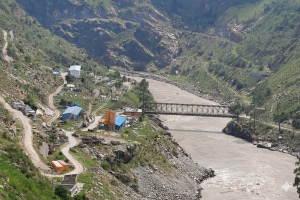UPSC Essentials : Daily Subject-wise quiz — History, Culture, and Social Issues (Week 15)
Are you preparing for UPSC CSE Prelims 2024? Check your progress and revise your topics through this quiz on History, Culture and Social Issues.
 Brush up your knowledge of History, Culture and Social Issues by solving the MCQs. (Image Source: File)
Brush up your knowledge of History, Culture and Social Issues by solving the MCQs. (Image Source: File) 🚨 This story is part of our special initiative for UPSC and other competitive exams. Look out for UPSC KEY on weekdays and UPSC Essentials everyday, Weekly news express with MCQs, Key Terms of the past week, Quizzes as well as The Indian Express 360° Upsc Debate, Society & Social Justice, UPSC Mains Practice, Art and Culture with Devdutt Pattanaik, UPSC Ethics Simplified, Experts Talk, and more. 🚨
Dear Aspirants,
Thank you for joining us for LIVE sessions. Every day we receive your emails and messages, in large numbers, with queries revolving around news and UPSC preparation in general. Each letter and text makes us feel that we need to do more to simplify your examination preparation journey. You will be happy to know that we will be LIVE every week on Wednesdays, take up your queries, provide you with cues from the news, and discuss a relevant theme revolving around news and UPSC preparation in general.
The popular question for this week: As most queries were related to Essays, let’s make it a theme for our upcoming LIVE session. We will take up other queries too.
You can send your queries at manas.srivastava@indianexpress.com or join Telegram: The Indian Express UPSC Hub or ask me Live! at 8 PM on July 19.
UPSC Essentials brings to you its initiative of subject-wise quizzes. UPSC Daily Subject Quiz covers all topics under the UPSC Civil Services syllabus, including Polity, History, Geography, Economics, Environment, Science and Technology, International Relations, and more. These quizzes are designed to help you revise some of the most important topics from the static part of the syllabus.
Each day, we will cover one new subject. Attempt today’s subject quiz on History, Culture and Social Issues to check your progress. Come back tomorrow to solve the MCQs on Environment, Geography, Science and Technology. Don’t miss checking the answers and explanations at the end of the quiz.
QUESTION 1
With reference to the Nehru-Liaquat Pact, consider the following statements:
1. Regarding East Bengal, West Bengal, Assam and Tripura there shall be freedom of movement and protection in transit.
2. It is also known as the Lucknow Pact.
3. The pact provided a framework for treating minorities in India and Pakistan.
How many of the statements given above are correct?
(a) Only one
(b) Only two
(c) All three
(d) None
QUESTION 2
With reference to the Samarth Ramdas, consider the following statements:
1. He was a Hindu saint who was also known as Sant Ramdas.
2. He was a devotee of Lord Ram and Hanuman.
3. He was a contemporary of Mughal Emperor Humayun.
How many of the statements given above are correct?
(a) Only one
(b) Only two
(c) All three
(d) None
QUESTION 3
Consider the following pairs:
(List I) (List II)
(Inscription) (Region)
1. Nigali Sagar Inscription Afghanistan
2. Uttaramerur Inscription Andhra Pradesh
3. Maski Inscription Karnataka
How many of the pairs given above are correct?
(a) Only one
(b) Only two
(c) All three
(d) None
QUESTION 4
“Palani Panchamirtham” has recently got Gepgraphical Indication (GI) tag. It is related to
(a) Karnataka
(b) Odisha
(c) Tamil Nadu
(d) Kerala
QUESTION 5
Which of the following phrases defines the nature of the ‘Hundi’ generally referred to in the sources of the post-Harsha period? (UPSC PYQ: 2020)
(a) An advisory issued by the king to his subordinates
(b) An order from the feudal lord to his subordinates
(c) A bill of exchange
(d) A diary to be maintained for daily accounts
ANSWERS TO MCQs
1. (b)
FYI:
— The Nehru-Liaquat Pact was a bilateral agreement signed between India and Pakistan to provide a framework for treating minorities in the two countries, India and Pakistan. Hence, statement 3 is correct.
— It is also known as the Delhi Pact. Hence, statement 2 is not correct.
— It was signed by the two country’s prime ministers, Jawaharlal Nehru and Liaquat Ali Khan.
— In respect of East Bengal, West Bengal, Assam and Tripura:
(a) There shall be freedom of movement and protection in transit. Hence, statement 1 is correct.
(b) There shall be freedom to remove as much of his moveable personnel effects and household goods as the migrant may wish to take with him.
(c) There shall be no harassment by the customs authorities.
(d) The right of ownership in or occupancy of the immovable property of a migrant shall not be disturbed.
Therefore, option (b) is the correct answer.
2. (b)
FYI:
— Samarth Ramdas (circa 1608 – 1681), also known as Sant Ramdas or Ramdas Swami, was a Hindu saint, philosopher, poet, writer and spiritual master. Hence, statement 1 is correct.
— He was a contemporary of Mughal Emperors Jahangir and Shahjahan. Hence, statement 3 is not correct.
— He was a devotee of Lord Ram and Hanuman, he toured the entire Indian subcontinent for 12 years, during which he came across various spiritual teachers and diverse religious traditions. Hence, statement 2 is correct.
— Ramdas has influenced Hindu nationalist thinkers across the years such as Lokmanya Tilak, RSS founder KB Hedgewar, and VD Savarkar.
— His paean to Lord Hanuman, Maruti Stotra, is still commonly recited by school children as well as wrestlers akhadas across Maharashtra.
Therefore, option (b) is the correct answer.
3. (a)
FYI:
| Inscription | Region |
| Nigali Sagar Inscription | Nepal |
| Uttaramerur Inscription | Tamil Nadu |
| Maski Inscription | Karnataka |
Therefore, option (a) is the correct answer.
(Other Source: ignca.gov.in)
4. (c)
FYI:
— Palani Dandayuthapani temple, located in Tamil Nadu has its own fan base for the panchamirtha offered to the devotees.
— This panchamirtha is made with natural ingredients like banana, jaggery, ghee, honey and cardamom.
Therefore, option (c) is the correct answer.
5. (d)
FYI:
— A hundi is a financial instrument that was developed for use in trade and credit transactions.
— Hundis are used to move money from one location to another, as a credit instrument to borrow money, and as a bill of exchange in trade operations.
— The Reserve Bank of India describes the hundi as “an unconditional order in writing made by a person directing another to pay a certain sum of money to a person named in the order.”
Therefore, option (d) is the correct answer.
Previous Daily Subject-Wise-Quiz
Daily subject-wise quiz — Polity and Governance (Week 15)
Daily Subject-wise quiz — History, Culture, and Social Issues (Week 14)
Daily subject-wise quiz — Environment, Geography, Science and Technology (Week 14)
Daily subject-wise quiz — Economy (Week 14)
Daily subject-wise quiz – International Relations (Week 14)
(The UPSC Essentials Indian Express is now on Telegram- Indian Express UPSC Hub. Click here to join our YouTube channel and stay updated with the latest updates.
Note: Catch the UPSC Weekly Quiz every Saturday evening and brush up on your current affairs knowledge.)
UPSC Magazine

Read UPSC Magazine
- 01
- 02
- 03
- 04
- 05































